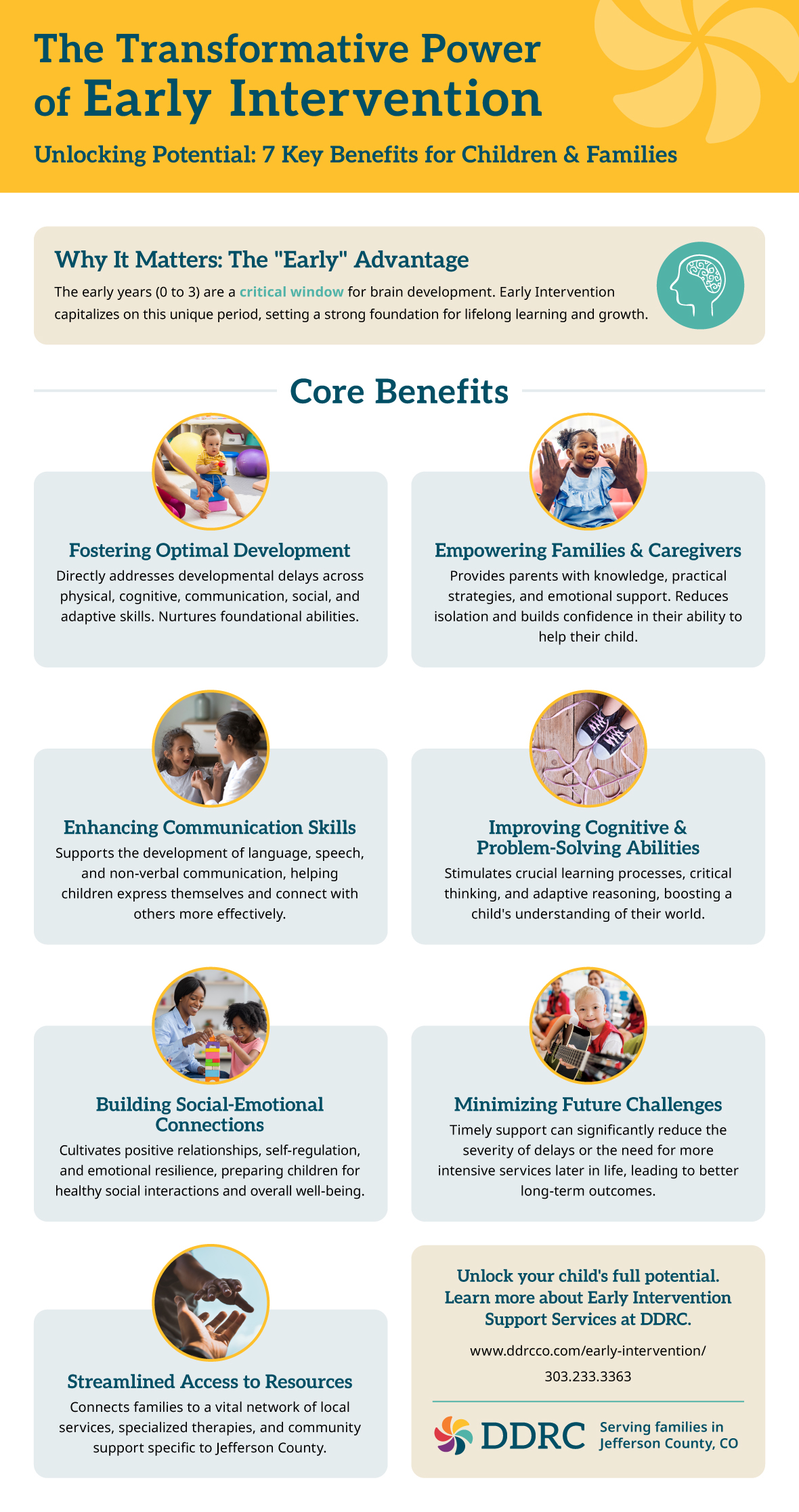
How Early Intervention Services and Support Help Development in the Early Years
The early years of a child’s life are full of growth, change, and discovery. During this critical window—birth to age three—the brain is developing faster than at any other time. For children who may be experiencing developmental delays or who have disabilities, early support can make all the difference. That’s why Early Intervention services and support are so essential. At DDRC, we believe in the power of starting early to unlock every child’s unique potential and lay the groundwork for lifelong learning and success.
This article explores what Early Intervention services are, who can benefit, and how they support development during a child’s formative years. If you’re a parent, caregiver, or early childhood professional in Jefferson County or surrounding areas, we’re here to help you understand your options and connect with the support your child deserves.
What are Early Intervention Services and Support?
Early Intervention services and support are specialized programs designed to assist infants and toddlers (birth through age three) who are experiencing developmental delays or have been diagnosed with a disability. These services are aimed at enhancing a child’s physical, cognitive, communication, social-emotional, and adaptive development.
At their core, Early Intervention services are centered around empowering families and supporting the natural learning that happens in everyday routines.
Services can include:
- Developmental evaluations
- Speech and language therapy
- Occupational therapy
- Physical therapy
- Behavioral support
- Vision or hearing services
- Family education and coaching
These services are typically provided in the home or community settings where children feel most comfortable. At DDRC, we prioritize family-centered care, so our team works in close collaboration with parents, guardians, and other caregivers to help integrate strategies into daily life.

Who Can Benefit from Early Intervention Services and Support?
Parents are often the first to notice when something seems different. Maybe your child isn’t babbling or crawling like their peers, or they seem uninterested in engaging with others. Trusting your instincts and seeking an evaluation early can lead to better outcomes. In Colorado, families can access these evaluations by contacting their local Early Intervention provider like DDRC.
Early Intervention services and support are designed for children under the age of three who are showing signs of developmental delay or have a diagnosed condition that puts them at risk for delays.
This includes, but is not limited to:
- Speech or language delays
- Motor skill difficulties
- Social or emotional challenges
- Cognitive or learning delays
- Diagnosed conditions such as Down syndrome, cerebral palsy, autism spectrum disorder, or hearing/vision loss
- Premature birth or low birth weight
- Complications during birth
According to the Cleveland Clinic, “Your child will qualify for Early Intervention if experts determine they have a developmental delay or disability. Some children automatically qualify if they’ve been diagnosed with a condition that’s likely to result in developmental delay. If your child doesn’t have such a diagnosis, they’ll go through an evaluation process.”
Here Are the Benefits of Early Intervention Services and Support in the Early Years
Understanding the benefits of Early Intervention support services can go a long way in interpreting your child’s needs. Here are 5 benefits:
1. Boosts Development During Critical Brain Growth
The brain is most adaptable and responsive to change in the first three years of life. In fact, research shows that 80% of a child’s brain is developed by the time they’re 3 years old. By addressing developmental concerns early, children can build strong neural connections that set the stage for future learning. This is especially impactful for skills related to communication, motor abilities, and problem-solving. The earlier support begins, the better the chances of mitigating delays or preventing them from becoming more significant.
2. Improves Communication and Social Skills
Early Intervention can make a profound difference in how children learn to express themselves and interact with others. For a child with delayed speech or language, working with a therapist early on can open the door to clearer communication, reduced frustration, and stronger relationships with caregivers and peers.
3. Supports Family Confidence and Connection
Parents and caregivers are a child’s first and most important teachers. Early Intervention services are designed to work in partnership with families, helping them learn how to support their child’s development during everyday routines—like mealtimes, bath time, or play. This not only strengthens the parent-child bond but also increases families’ confidence and understanding of their child’s needs.
4. Promotes School Readiness and Long-Term Success
Children who receive Early Intervention often enter preschool and kindergarten better prepared to participate, engage, and succeed. They’re more likely to require fewer special education supports later on and are better equipped to thrive in inclusive settings. Research shows that high-quality Early Intervention leads to improved academic performance, better employment outcomes in adulthood, and increased independence.
5. Reduces Future Costs of Care and Services
According to the Centers for Disease Control and Prevention (CDC), Early Intervention can significantly reduce the need for more intensive—and often more costly—services later in life. Investing in a child’s development during the early years saves money in health care, education, and social services while improving quality of life.
The Early Intervention Process
In Colorado, the Early Intervention process follows a coordinated approach to ensure families get timely and appropriate services. Here’s what it typically looks like:
Step One: Referral
Parents, pediatricians, childcare providers, or other professionals can refer a child for an evaluation. Families can also refer their own child by contacting their local Early Intervention program.
Step Two: Evaluation
A multidisciplinary team conducts a developmental evaluation to determine whether a child is eligible for services. This may involve observing your child, asking questions, and using screening tools to assess areas like speech, motor skills, and social behavior.

Did you know?
DDRC conducts 80-100 Early Intervention evaluations each month, with close to 90% of children qualifying for ongoing Early Intervention services.
Step Three: Individualized Family Service Plan (IFSP)
If eligible, the team works with the family to develop an IFSP. This document outlines the child’s goals, the services they’ll receive, and how progress will be measured. Families are integral partners in this process.
Step Four: Service Delivery
Services are provided in natural environments, such as the home or a childcare center, and are designed to fit into your family’s routines. Providers work closely with caregivers to ensure strategies are realistic, sustainable, and effective.
Step Five: Ongoing Review and Transition Planning
Progress is reviewed regularly, and adjustments are made as needed. As a child approaches their third birthday, the team helps plan the transition into preschool services or other appropriate supports.
Why Choose DDRC for Early Intervention Support Services in Jefferson County?
As the designated Early Intervention provider for Jefferson, Clear Creek, Gilpin, and Summit counties, DDRC has been a trusted partner for families across Colorado for decades. Our team includes speech-language pathologists, occupational therapists, physical therapists, developmental specialists, and service coordinators who are deeply committed to helping every child succeed.
What sets DDRC apart is our holistic, family-centered approach. That means we listen, we collaborate, and we tailor services to your unique situation and goals. Here are a few aspects of our Early Intervention services and support that stand out:
- Free Early Intervention service evaluations for children under age 3
- Highly skilled, compassionate professionals
- Services delivered in your home or community
- Bilingual support available
- Guidance through every step of the process
- Individualized plans that respect your values and routines
We’re here to make this process feel supportive, not overwhelming. More than that, we’re here to celebrate every success with you along the way.
Your Child’s Potential, Our Unwavering Support
Every child deserves the chance to thrive. With Early Intervention services and support, families can take proactive steps to nurture their child’s development, boost confidence, and lay the foundation for a bright future. At DDRC, we’ve seen how small, early steps lead to big, lifelong victories.
If you have questions or think your child may benefit from an evaluation, don’t wait. Contact DDRC today to learn more about how our Early Intervention services can support your family in Jefferson County and beyond. We’re here for you—and we believe in what’s possible.
